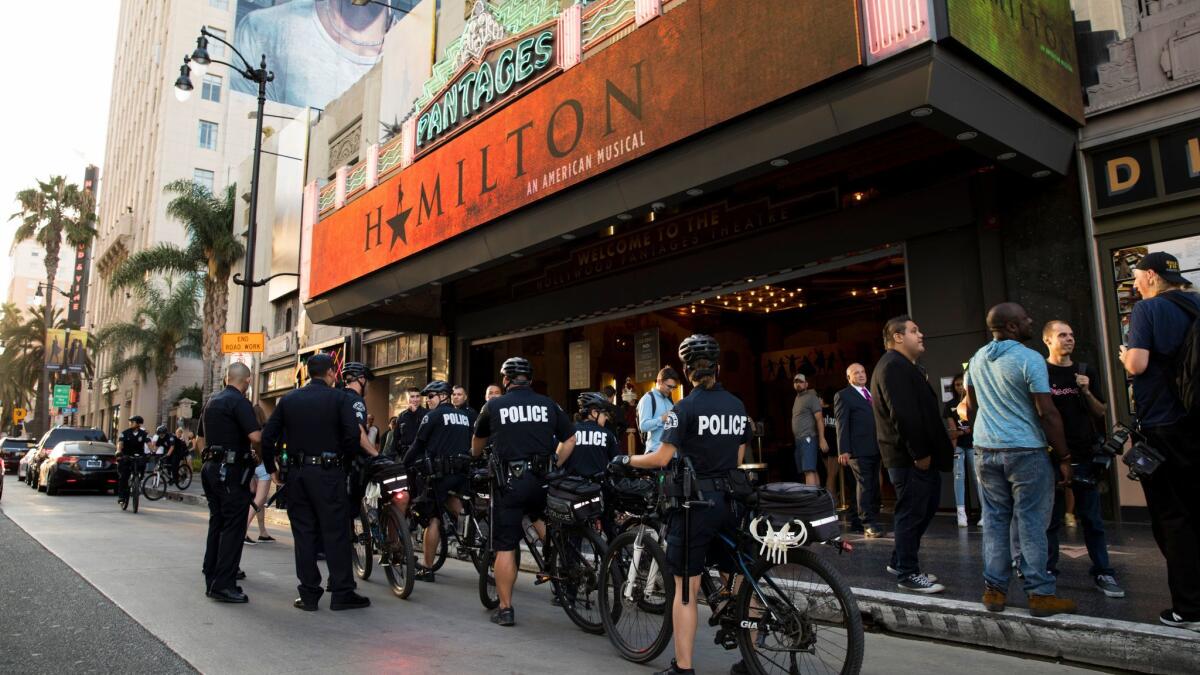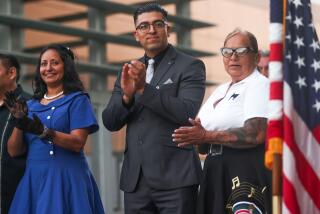‘Hamilton’ tickets without the wait — or the cost? It helps to be an L.A. politician

- Share via
When “Hamilton” came to the Pantages Theatre last year, Angelenos clamored for tickets to the celebrated musical.
Some spent hours in line. Others ponied up hundreds or even thousands of dollars to scalpers for resold tickets.
But for many Los Angeles politicians, getting into the hottest show in town was much easier. Instead of making them line up outside the theater, the Pantages came to them, offering each one a coveted pair of tickets to opening night.
Most members of the City Council snapped up the two tickets. Some asked if they could get a few more: City Council President Herb Wesson ultimately accepted six tickets to the August show from the theater owner, a gift worth nearly $1,000, according to his office.
That far exceeded the state limit on gifts to an elected official, which are capped at $470 annually from each giver covered by the rules.
Wesson later reimbursed the company for the tickets, according to his spokeswoman Vanessa Rodriguez. Under state law, a gift does not count as a gift if the politician reimburses the giver within 30 days of receiving it. But Wesson paid the theater back only months later, with two checks in December and January, according to his office.
Free tickets are a routine part of political life in Los Angeles, where lawmakers have been given free seats at Dodgers games, galas and other events, city disclosures show.
Politicians can legally accept them if they stay within city and state rules, which include restrictions on who can give them gifts and how much they can accept. Those rules are meant to prevent especially lavish gifts from swaying government decisions or corroding public trust.
Even if a gift giver is not seeking anything from politicians, gift limits matter because “one of the expectations of public officials is that it’s not a job of being a rock star and royalty — it’s a job first and foremost to help the public,” said Fair Political Practices Commission spokesman Jay Wierenga. “Reasonable people would understand there are some perks to these positions, but they shouldn’t be abused.”
Kathay Feng, executive director of California Common Cause, said that politicians should have been cautious and checked how much the tickets were worth, especially given the frenzy around the show.
After “Hamilton” opened in L.A., The Times reported that while Pantages was selling tickets for as little as $85, they were being resold for an average of $467 to $510 per ticket on websites such as StubHub and SeatGeek.
“Everybody knew how popular opening night would be,” Feng said. “Those tickets were in such high demand.”
The tickets were greeted with delight by many politicians, but there appears to have been scant agreement over how to handle the offer. Councilmen Curren Price, Marqueece Harris-Dawson and Mitch Englander accepted the entire value of tickets — $390 for each pair — as a gift that fell under the state limits, staffers said.
Other politicians repaid the company for some or all of the value of the tickets, according to their aides.
Several, like Wesson, repaid the company months after the legal window had closed. Councilman Joe Buscaino, who accepted four tickets worth a total of more than $600, reimbursed the company for $250 of the cost in December after being informed of the cost of the tickets, according to his spokesman, Branimir Kvartuc.
Councilman Jose Huizar asked if his wife and two daughters could go in his place. He did not repay the theater for the tickets until December, according to his spokesman, Rick Coca, who did not promptly respond to questions about their value.
Three tickets would likely exceed the limit of $470: Pantages was selling tickets that ranged from $85 to $650, with council members seated in a section where tickets cost as much as $195 each, according to an email from the company to one office.
Bob Stern, former president of the Center for Governmental Studies, said it was good that lawmakers had eventually paid back the company for tickets that exceeded the California gift limit, “but what were they thinking when they accepted it in the first place?”
”Didn’t they know about the law? And if they didn’t, why not?” Stern asked.
Questions had arisen about the “Hamilton” tickets within a few months of the show: Ethics Commission staff requested information from the theater company in November about the tickets. Wesson spokeswoman Vanessa Rodriguez said that as far she knew, the commission had not contacted the council president about the issue.
Rodriguez said Wesson ultimately decided to fully repay the company after getting differing advice from attorneys about the gift. He had initially accepted the tickets, Rodriguez said, because “Hamilton” represented “the first time that musical theater was really embracing race and inclusion” and “he wanted to be part of a historic event.”
Staffers for several other lawmakers who repaid the company in December or later, including Huizar, said it was simply an oversight that they had not reimbursed the company more quickly.
Pantages officials said they had invited more than 1,900 guests to the show that night, including celebrities, friends and members of the media.
Elected officials were among the invited guests because “Hollywood Pantages Theatre management believed its message of diversity, inclusion and opportunity was perfect for civic and community leaders to be exposed to. … We wanted them and everyone in attendance to get excited about the birth of our nation, our system of government, and carry the political dialogue with civility, dignity and inclusion,” the theater said in a statement.
The Pantages is owned by Ned Pan Inc., which provided the tickets to lawmakers, according to its attorney Andrew Kugler. An email invitation was sent by one of its officers, David Green, who later emailed politicians to confirm that they were RSVPing to the show and wrote that he was doing so “on behalf of James Nederlander,” who heads Ned Pan and other entertainment companies.
Nederlander is a familiar name to politicians at City Hall: Nederlander-Greek Inc., which used to operate the Greek Theatre, heavily lobbied the city three years ago to keep that contract after a city commission recommended handing it to rival company Live Nation.
Instead, the city ultimately decided to run the Greek itself, allowing concert promoters to book acts there. Each time it wants to book a show at the Greek, Nederlander Anaheim Inc. signs an agreement with a management firm that acts as an agent for the city.
Last year, Ned Pan Inc. paid a lobbying firm more than $26,000 to try to sway the planning department between July and December, according to paperwork filed with the city. Kugler said Ned Pan had not “met with, discussed or sought to influence any city council member” on those issues, which included a proposed Vine Street bar and a possible loading dock next door.
Another company linked to James Nederlander, Nederlander Concerts Los Angeles LLC, spent $10,000 in December for lobbying related to the Greek Theatre, according to disclosures. Lobbyist Arnie Berghoff said he discussed the Greek with council members during that time, but had not asked lawmakers for anything tied to the theater.
Kugler stressed that the concert company was a separate business and said that Ned Pan Inc. “believes it is in compliance with all applicable gift laws.”
In addition to the state limit of $470 annually, Los Angeles imposes a stricter limit of $100 annually on gifts to elected officials from “restricted sources,” which include city contractors and people who have recently sought to influence those officials on something that affects them financially. Lawmakers are also barred from asking for gifts from those sources.
More broadly, L.A. bars city officials from asking for or accepting any gifts when it is “reasonably foreseeable” that they could be influenced by those gifts in their official duties.
Los Angeles City Ethics Commission staff did not answer questions from The Times about whether the “Hamilton” tickets were subject to the stricter limit, but several council members treated them as if they were, reimbursing the company for all but $100 of the ticket value.
In a September letter, Councilman Paul Koretz thanked Green for the “Hamilton” tickets and said he could accept only $100 in gifts from the company because it was a “restricted source,” offering a personal check for the rest of the admission price for him and a guest.
Koretz said it “just seemed like the safer way to go.”
His wife, Gail Koretz, who works for Mayor Eric Garcetti, accepted an additional two tickets worth $250 as a gift because the company is not a restricted source for her, the councilman said. Los Angeles has different rules about who counts as a restricted source for city staffers who are not elected.
A few politicians did not go: Councilman Mike Bonin turned down the offer. Councilman Paul Krekorian, City Controller Ron Galperin and City Atty. Mike Feuer said they were unable to attend. And Councilman Bob Blumenfield went to see the show on another night and paid directly for his own tickets, his district director Michael Owens said.
Twitter: @AlpertReyes
More to Read
Sign up for Essential California
The most important California stories and recommendations in your inbox every morning.
You may occasionally receive promotional content from the Los Angeles Times.











